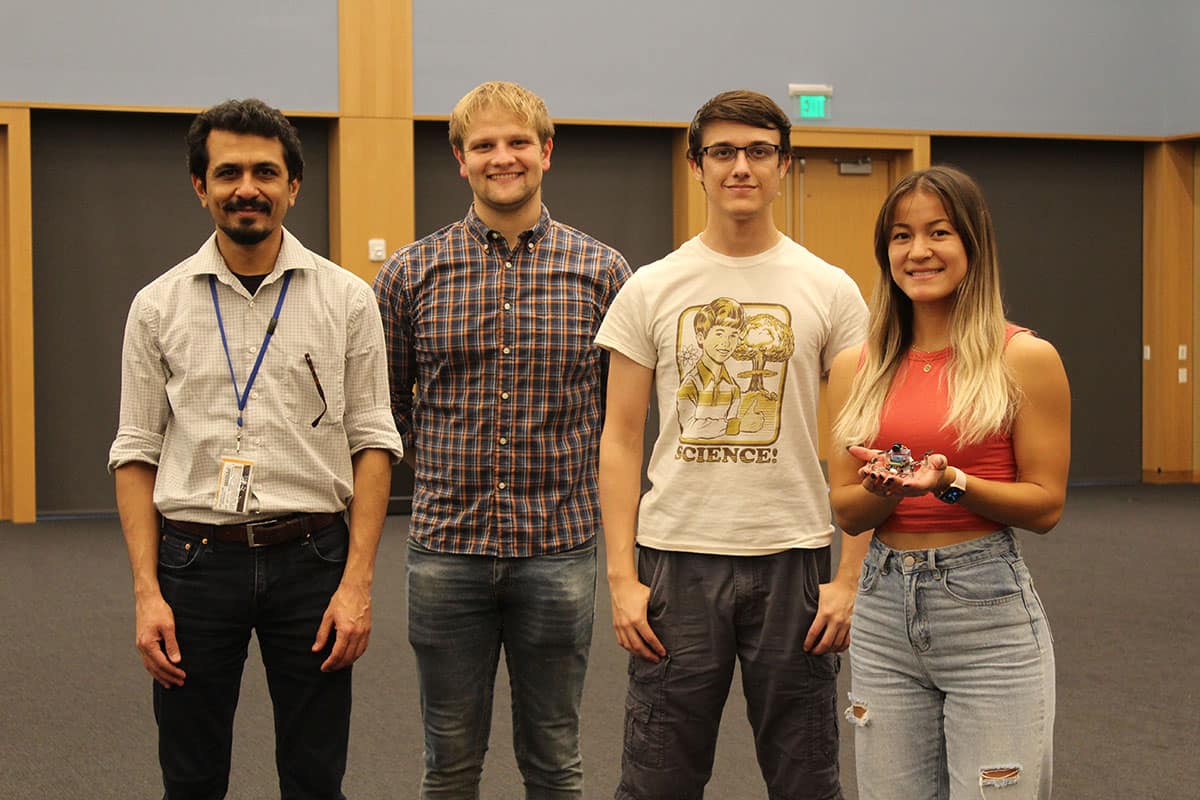Aerospace Engineering Professor Cultivates Career Success for Students

Since Dr. Morad Nazari joined the Embry-Riddle Aeronautical University faculty in 2017, he has helped train and cultivate high-achieving engineers who have landed great jobs at big-name institutions.
Among the students who have come through his Dynamics and Control Systems Laboratory, one is now a guidance, navigation and control analyst at Johns Hopkins University Applied Physics Laboratory. Others have worked at NASA’s Jet Propulsion Laboratory, Boeing, United Airlines and NASA’s Kennedy Space Center.
"Professor Nazari is an outstanding mentor,” said Dr. Jim Gregory, dean of the College of Engineering. “He skillfully guides students through learning technical details and developing the analytical problem-solving skills that will serve them well in high-tech jobs."
Nazari, associate professor of Aerospace Engineering, came to Embry-Riddle “motivated to contribute to the growth of the relatively new Aerospace Engineering graduate program,” he said.
Born in Iran, Nazari has always been passionate about mathematics, mechanical engineering, space and civil engineering. He scored in the top 0.1% on the national university exam in Iran and ranked first nationwide in his graduate school entrance exam in Applied Mechanics. He earned his master’s degree in Mechanical Engineering, switching to Aerospace Engineering in the first year of his Ph.D. He has co-authored two book chapters and more than 60 journal publications and conference proceedings. And in April of 2023, he received the Graduate Teaching Award from Embry-Riddle’s Department of Aerospace Engineering.
Brennan McCann started working with Nazari when he began his graduate school program at Embry-Riddle in 2019.
“I think Dr. Nazari’s students go on to great success because they are able to speak confidently and competently to a wide range of topics that are applicable to everyday spacecraft development,” McCann said.
McCann, who earned his Ph.D. in December 2023 after being named Outstanding Ph.D. Student in April 2023, works as a guidance, navigation and control analyst at the Johns Hopkins Applied Physics Laboratory.
McCann said Nazari instills “a strong appreciation for the foundational theory upon which all of our research is built.”

Top row, left to right: Rahil Golakiya, Marco Fagetti, Javier Robinson, Junpeng Zhou; bottom row: Nazari, Brennan McCann, Sagar Sarkar (Photo: Morad Nazari)
“He constantly asks questions about the underlying theory behind everything we do. What this means is that his students have an incredibly strong foundation with a wide breadth of knowledge,” said McCann, who published more than 20 conference papers and journal articles during graduate school. “He wants us to make sure we know where each step in our research development comes from and why it works in theory and in practice.”
McCann explained that employers of Nazari’s students “know the students will be able to sanity-check complex systems against foundational theory, which is an invaluable skill as the individuals who developed and implemented those theories begin to retire.”
When McCann left Embry-Riddle at the end of last year, he passed the baton to Herman Gunter V, who is finishing a master’s degree and will continue to earn his Ph.D.
“Dr. Nazari has certainly impacted my path,” Gunter said. “It was the inspiration of his Ph.D. student Brennan McCann that led me to graduate school in the first place.”
Gunter attributes his professor’s excellent track record of training successful engineers to “his support of and dedication to developing his students,” he said. “Dr. Nazari makes sure that his students are provided with all they need to perform well, and as a result, they are much better equipped to produce successful results. He meets with us regularly to check on how things are going and to suggest methods that we might be able to use to approach anything we’re having trouble with.”
Ph.D. candidate Matthew Wittal had just started earning a master’s degree at the University of Arizona (UofA) when he got an offer from the Kennedy Space Center (KSC) to join the NASA Pathways Internship Program. Deciding to accept and move to Florida, his professor at UofA recommended that Wittal contact his former pupil, Nazari, as a potential advisor.
“Transitioning to Dr. Nazari’s mentorship was a natural fit,” Wittal said.
Wittal is on track to finish his Ph.D. at Embry-Riddle in May 2025 and continues to work at KSC.
Commenting on Nazari’s success as a mentor, he called out his attention to detail and “disciplined approach to methodology.”
“There is no taking shortcuts when working with Dr. Nazari. Such attention to detail is needed to ensure the safety of our astronauts,” Wittal said. “I have been fortunate that the work I have been doing under the tutelage of Dr. Nazari has found direct application in my work at KSC, and my work at KSC has given me insight into the practical application of problems that I feel has likewise lent credibility to our research group. I am privileged to have had such a patient and fastidious advisor.”
Carla Cabero, an undergraduate in Nazari’s lab who is entering her senior year in the fall, called Nazari a professor and supervisor who “cares a lot about his students and directs their research very well.”
She says Nazari has “opened the possibility of being able to carry out research in a branch of Aerospace Engineering that interests me and in which I want to deepen.”
Simone Sarzotti, an Italian exchange student from Politecnico di Torino, spent six months at Embry-Riddle working with Nazari, calling it “an amazing experience and opportunity. He has a deep knowledge of his field, and he is always capable of helping you with the most difficult questions.”
Moreover, Sarzotti, who just earned his master’s degree and has employment possibilities with some large European space companies, said Nazari “was really kind to me when I arrived from Italy, asking if I needed anything, if I had found a house, if I was doing good, if I needed a ride to school — all these little things that really showed how good a person he is.”

 Michaela Jarvis
Michaela Jarvis